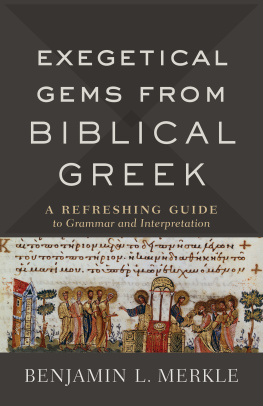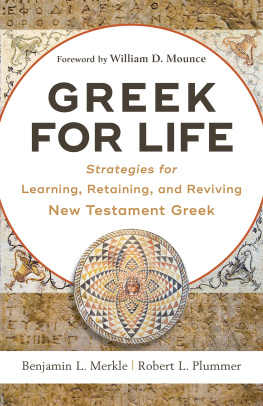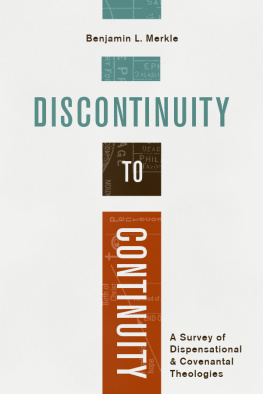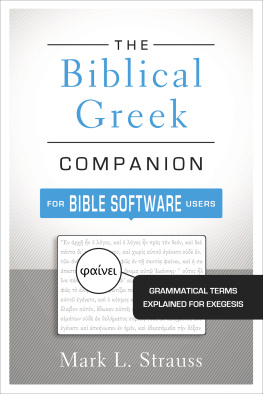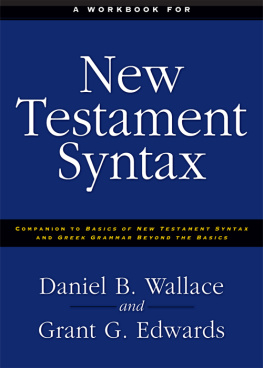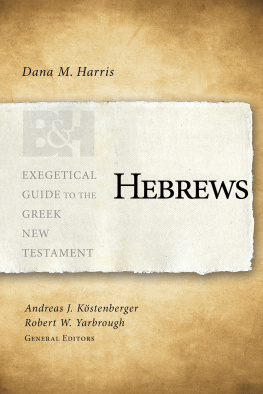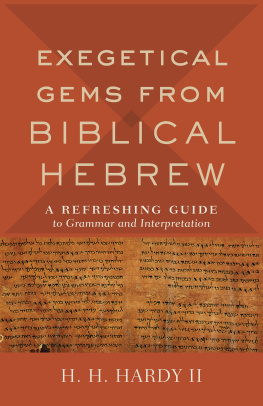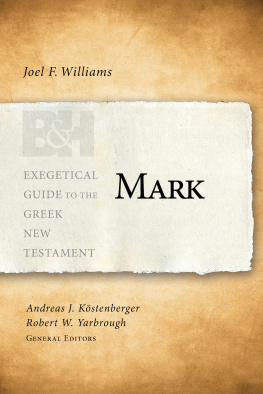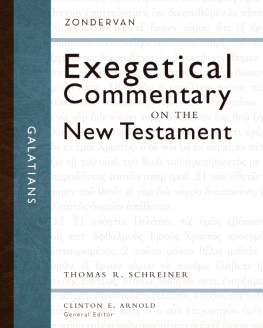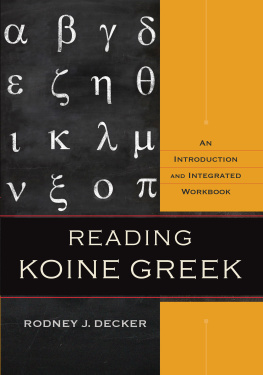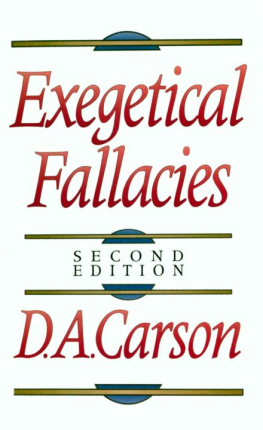Copyright Page
2019 by Benjamin L. Merkle
Published by Baker Academic
a division of Baker Publishing Group
PO Box 6287, Grand Rapids, MI 49516-6287
www.bakeracademic.com
Ebook edition created 2019
All rights reserved. No part of this publication may be reproduced, stored in a retrieval system, or transmitted in any form or by any meansfor example, electronic, photocopy, recordingwithout the prior written permission of the publisher. The only exception is brief quotations in printed reviews.
Library of Congress Cataloging-in-Publication Data is on file at the Library of Congress, Washington, DC.
ISBN 978-1-4934-1814-5
Unless otherwise indicated, Scripture quotations are from The Holy Bible, English Standard Version (ESV), copyright 2001 by Crossway, a publishing ministry of Good News Publishers. Used by permission. All rights reserved. ESV Text Edition: 2016
Scripture quotations labeled CSB are from the Christian Standard Bible, copyright 2017 by Holman Bible Publishers. Used by permission. Christian Standard Bible and CSB are federally registered trademarks of Holman Bible Publishers.
Scripture quotations labeled NASB are from the New American Standard Bible (NASB), copyright 1960, 1962, 1963, 1968, 1971, 1972, 1973, 1975, 1977, 1995 by The Lockman Foundation. Used by permission. www.Lockman.org
Scripture quotations labeled NIV are from the Holy Bible, New International Version. NIV. Copyright 1973, 1978, 1984, 2011 by Biblica, Inc. Used by permission of Zondervan. All rights reserved worldwide. www.zondervan.com. The NIV and New International Version are trademarks registered in the United States Patent and Trademark Office by Biblica, Inc.
Scripture quotations labeled NKJV are from the New King James Version. Copyright 1982 by Thomas Nelson. Used by permission. All rights reserved.
Contents
Cover
Half Title Page
Title Page
Copyright Page
Introduction
Abbreviations
1. Koine Greek
Matthew 18:8
2. Textual Criticism
Romans 5:1
3. Nominative Case
John 1:1
4. Vocative Case
Ephesians 5:2122
5. Genitive Case
1 Timothy 3:6
6. Dative Case
Ephesians 5:18
7. Accusative Case
Romans 10:9
8. The Article
1 Timothy 3:2
9. The Granville Sharp Rule
Titus 2:13
10. Colwells Canon
1 Timothy 6:10
11. Adjectives
2 Timothy 3:16
12. Verbal Aspect
Matthew 16:24
13. Present Indicatives
1 John 3:6
14. Imperfect Indicatives
Galatians 1:13
15. Future Indicatives
Matthew 4:4
16. Aorist Indicatives
Ephesians 4:20
17. Perfect and Pluperfect Indicatives
John 19:30
18. Subjunctive Mood
Hebrews 13:5
19. Imperative Mood
Matthew 6:11
20. Optative Mood
1 Corinthians 6:15
21. Adverbial Participles
1 Peter 5:67
Matthew 28:19
23. Periphrastic Participles
Matthew 18:18
24. Infinitives
1 Timothy 6:1718
25. Pronouns
Luke 16:1920
26. Prepositions
Ephesians 4:12
27. Adverbs
Romans 11:26
28. Conjunctions and Particles
Philippians 2:1213
29. Conditional Sentences
Colossians 1:23
30. Figures of Speech
Matthew 5:13
31. Context
Philippians 4:13
32. Word Studies
Ephesians 1:10
33. Exegetical Fallacies
John 21:1517
34. Discourse Analysis
Hebrews 1:45
35. Diagramming
Hebrews 6:46
Scripture Index
Back Cover
Introduction
Why This Book?
In one sentence, I wrote this book as a tool to help current and former students of New Testament Greek prosper and ultimately succeed in using the Greek they worked so hard to acquire. Because there is currently no book like this one, allow me to explain its uniqueness. The 2017 book that I coauthored with Robert Plummer offered practical strategies for acquiring Greek, maintaining it, and getting it back if it becomes rusty. That book is intended to encourage and inspire without getting too deep into the details of Greek grammar and syntax. It also offers some powerful testimonies from pastors who use their Greek in ministry, and it presents a few devotional reflections from the Greek New Testament.
In one sense the present book has the same ultimate goal as Greek for Life , but it pursues it very differently. As the title indicates, this book offers a collection of exegetical gems, loosely defined as substantial insights from NT passages gained by a proper knowledge and use of Greek. Knowledge of NT Greek does not answer every exegetical or theological question that people raise. It does, however, make a significant difference in many key passages, providing exegetical answers to debated texts. Seeing such examples is encouraging to current and former students of NT Greek and provides motivation for continued use of the language.
There is another practical outcome of reading this book. Lets face it, reviewing Greek can be difficult and tedious. Even if you have already taken Greek, reading through an 800-page grammar can be daunting and even discouraging. But what if there were a way to review the basics of Greek syntax without needing to reread a reference grammar? What if there were a tool that not only reviewed such syntax but also demonstrated the exegetical payoff along the way? What if the content of a massive grammar were condensed into less than 200 pages, with dozens of exegetical gems uncovered in the process? That is precisely what this book seeks to accomplish.
What Is This Book?
This book consists of thirty-five chapters, each of which offers two main things: (1) an exegetical gem from the NT and (2) a review of some aspect of Greek syntax. By the time you finish reading through this book, you will have reviewed all of the basics typically covered in a second-year (or second-semester) Greek syntax and exegesis course. The order in which topics are presented generally follows that of a book I coauthored with Andreas Kstenberger and Robert Plummer.
Each chapter follows the same basic format: (1) introduction, (2) overview, and (3) interpretation. The introduction presents the biblical text containing the exegetical gem for the chapter. It also raises a question that can be answered with a sufficient knowledge of Greek, especially knowledge of the topic covered in the chapter. Then the overview offers a brief account of the relevant aspect of Greek syntax and, within the broader topic, helps situate the precise insight needed to answer the exegetical question. The final, interpretation section applies the newly acquired insight to the exegetical question and offers a solution.
For Whom Is This Book?
This book can be used in various contexts by a variety of readers, but I will highlight the most obvious audiences:
- College or seminary students . This book will be helpful whether you are first learning Greek or are in a more advanced course. For example, if you are currently taking Greek syntax, this book provides numerous examples of how knowing Greek makes a difference in the way we interpret the Bible. Reading this book alongside your main textbook will provide a condensed summary of the material in an accessible format.
- Former Greek students . If you took Greek many moons ago and are a bit rusty, or if you are looking for helpful tools so you dont get rusty, then this book is for you. Although some of you might enjoy casually reading a book on Greek grammar or syntax, most wont find that very appealing. Most grammars are designed as reference tools rather than as classroom textbooks. This book offers you a way to glean new insights from knowing Greek but at the same time enables you to review all the basics of Greek syntax.

